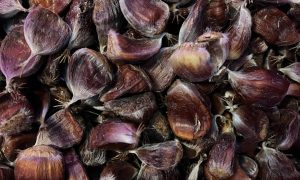
One of the consequences of it having rained non-stop for the last two years is that there’s been a bumper crop of fruit this year. I’ve had so many apples I’ve run out of recipes and am having to make clothes out of them. The socks are good but the trousers are a bit clingy.
And now it’s chestnuts. The heavy downpours at the start of the week left a carpet of the things like I’ve never seen before. Hundreds of them strewn all over the ground, some still in their cases, some lying naked in the grass. So I started gathering them up, thinking I might be able to turn them into something a bit tasty.
Chestnuts are very good for you, it says here. They’re high in fibre and energy but, unlike other nuts, low in fat. Also unlike other nuts, they give you a good shot of vitamin C. And they contain lots of minerals, like magnesium, zinc and potassium, so if you want to make a bomb…
In fact, chestnuts are explosive. Try cooking them without slitting open their shells first and you’ll find out. Chestnuts roasting on an open fire could mean Christmas in A&E if you don’t prep them right.
The most important thing, though, when cooking with chestnuts, is to make sure you have the right kind of chestnut. The horse chestnut, or conker, is not edible. Neither is it a chestnut. Despite the chestnut coloured nut and the spiky casing, it is a different genus altogether. Horse chestnuts came from Asia and belong to a family called Sapindaceae; sweet chestnuts are from southern Europe and belong to the genus Castanea, which is what the Romans called them, from the Greek kastaneia.
It’s where the Spanish ‘castanet’ comes from, meaning ‘little chestnut’. A bit odd really – I’m not a Flamenco dancer but surely ‘big chestnut’ is nearer the mark! That said, ‘castanet’ is more onomatopoeic than ‘castaña grande’.
There are some pretty big chestnut trees out there, though. On the slopes of Mount Etna, just a ball of moulten lava’s throw from the crater, stands an ancient chestnut tree called ‘Castagno dei Cento Cavalli’ or ‘The Hundred-Horse Chestnut’. A confusing name, as it’s not a horse chestnut. Legend has it that a Queen and her hundred knights sheltered under it once.
Anyway, it measures 190 feet round and is over 2,000 years old, making it the oldest known chestnut tree in the world. NB: the oldest known chestnut tree. I love the thought that there might be an even older chestnut tree out there somewhere, lurking undiscovered. To paraphrase Withnail & I, “Imagine the size of its nuts!”
The chestnuts I’ve gathered are not very big. I’m a bit worried about that. Compared to the ones in the pictures I’ve seen online, they’re positively small and a bit squidgy. Does this mean they’re no good? Ah well, only one way to find out. And if the risotto, soup and stuffing don’t come up to scratch, I can always make them into a scarf.


